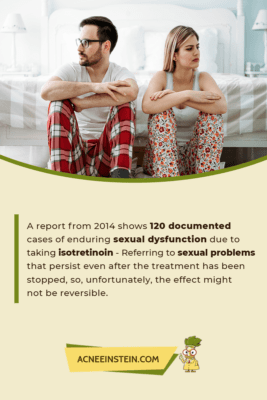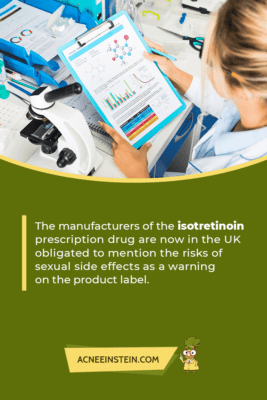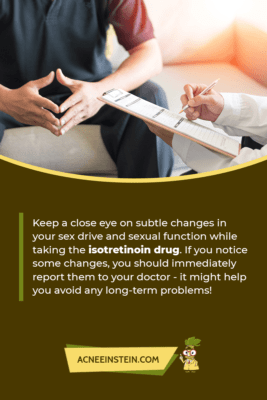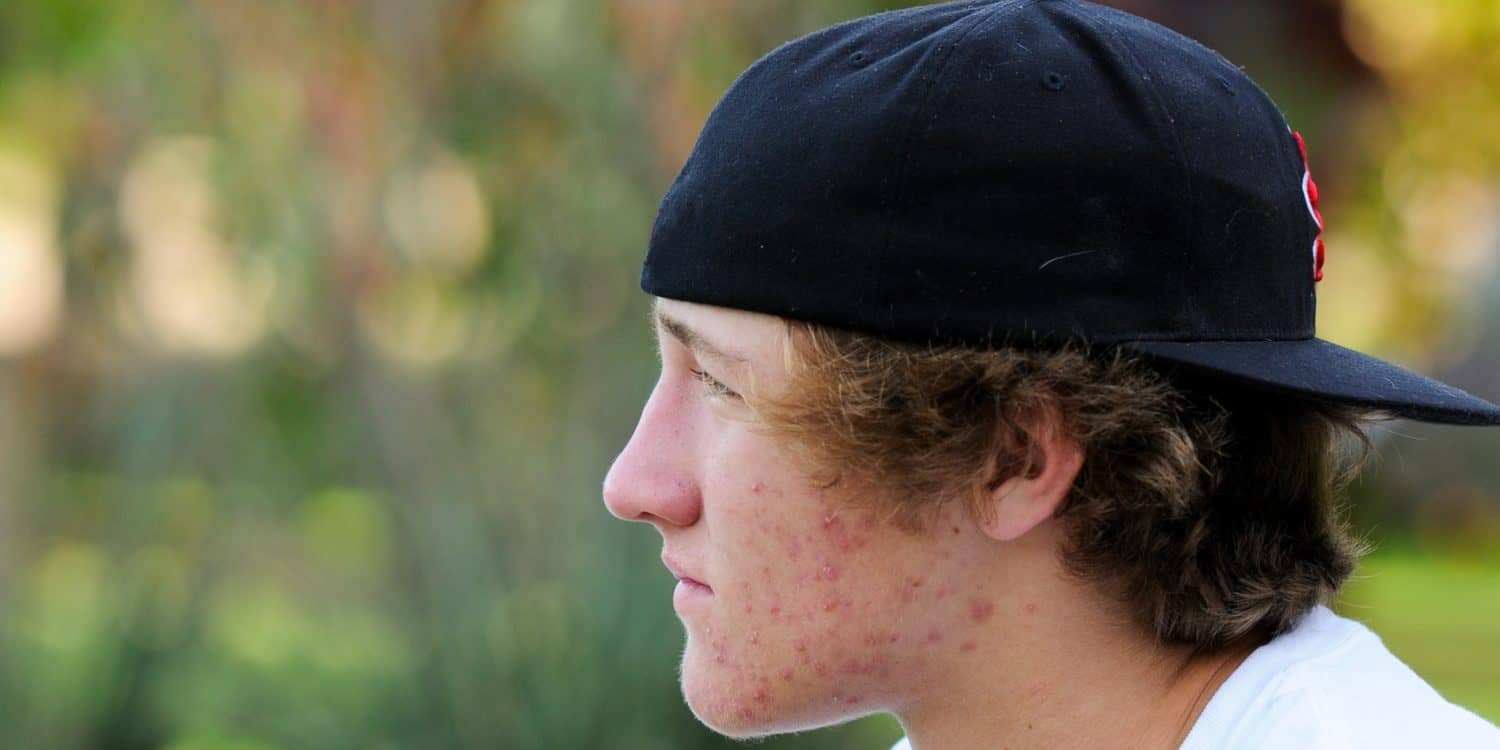The link between isotretinoin and erectile dysfunction is gradually emerging. Here’s what we know now and what we can expect in the future.
Isotretinoin, known by other brand names such as Accutane and Absorica, is a popular prescription drug used to treat severe acne. Anyone who has experienced nodular or cystic acne is well aware of isotretinoin and its general effectiveness. But while it is a potent acne medication, it does carry the potential for some significant side effects.
Some common side effects of isotretinoin are typical signs of dry skin and chapped lips. Unfortunately, this prescription acne drug can also cause other severe side effects. These side effects include increased irritability, suicidal thoughts, or even mental depression.

While the psychological problems have gained widespread attention, sexual problems remain underreported. Increasing evidence suggests that isotretinoin could be linked to a number of sexual problems in both males and females. Male patients taking isotretinoin have reported a significant decrease in libido and loss of ability to get or maintain an erection. Even worse, some patients say their problems lasted several years, even after stopping the drug.
Isotretinoin and Erectile Dysfunction: When Did the Story Begin?
There is no question that finding an exact link between isotretinoin and erectile dysfunction has been an elusive process. And, as such, no one is completely sure when the story began. However, a 1994 study published in The Lancet reported more than 150 cases of ejaculatory problems in people taking oral isotretinoin. While it may be a remarkable number, these cases occurred over several years since the launch of the drug in 1983.
In 2005, a study noted that six male patients who took isotretinoin developed problems with erection as well as symptoms of depression. According to the authors, it was the first time that such side effects had been reported. While the study provided some interesting insight, the low number of study participants may have been a limitation. Still, it may provide deeper insight into erectile dysfunction as a result of depression caused by the drug.
Further reports from 2014 have shown a more recent impact with 120 reports of enduring sexual dysfunction in more than 20 different countries. Enduring sexual dysfunction is defined as sexual problems that persist even after treatment has been stopped. In other words, those who may be thinking that effects can easily be reversed should be aware of the possible complications from just starting the medication.
.

An article by rxisk.org also discusses anecdotal reports of enduring sexual dysfunction and provides an in-depth look at the development of the isotretinoin link. According to the article, some isotretinoin users have reported mild sexual side effects during treatment. However, after stopping treatment, they have reported worsening sexual side effects sometimes lasting for years in some users. This may be in line with the fact that isotretinoin has residual anti-acne effects after stopping the treatment (although these effects may depend on the dose being taken).
Isotretinoin and Erectile Dysfunction: What We Know Now
On October 26, 2017, Medicines and Healthcare products Regulatory Agency (MHRA), Government of UK, in its drug safety update, reported that isotretinoin could cause erectile dysfunction and libido problems in a relatively small number of users. The update urges isotretinoin users to report any such problems if they experience them during the course of therapy.
In addition, manufacturers in the UK are now asked to follow a new labeling requirement for drug products that contain isotretinoin. The new regulation requires manufacturers to mention the risk of sexual side effects as a warning or precaution.
This step came after a European review found that the risk was significant and warranted attention. The review, which analyzed 689 events in 471 patients, revealed:
- 311 cases of problems with erection and ejaculation.
- 43 cases of problems with semen and fertility.
Other countries have also put in the effort to raise awareness of similar adverse effects. Health Canada, for instance, reviewed over 200 international reports on the link between isotretinoin and erectile dysfunction. In 2017, after conducting their own research, they made official recommendations to include erectile dysfunction as a side effect for all isotretinoin products. Since then, they have continued to monitor safety information regarding these effects.

How Could Isotretinoin Cause Erectile Dysfunction and Decreased Libido?
Because the issue has not been extensively studied in a large number of participants, it is impossible to pinpoint exactly how isotretinoin could cause these problems. However, preliminary findings point towards the possibility that a decrease in male hormone production could be the culprit.
The aforementioned European review concluded:
The totality of data presented in this review suggest there is evidence that isotretinoin can be associated with sexual dysfunction including erectile dysfunction and decreased libido and that the mechanism may be a reduction in plasma testosterone.
Other studies have also found significant reductions in testosterone levels in those using isotretinoin. Note that testosterone, the major male hormone, is a key driver of sexual arousal and erection. Interestingly, one of the proposed ways that isotretinoin may produce its therapeutic effects is through suppressing testosterone levels in the body.
Another possible cause of sexual problems could be the effect of mental issues on one’s sex drive. There are several reports that show a link between isotretinoin and psychiatric conditions such as depression. Because depression can negatively impact your sex drive, this reason seems just as likely as the testosterone hypothesis.

Isotretinoin also belongs to the same class of medications (retinoids) as acitretin, a similar drug that has been associated with sexual problems. This may be yet another possible link between isotretinoin and erectile dysfunction. Case reports have shown evidence that acitretin can cause erectile dysfunction, sometimes more than a month after starting treatment. However, symptoms seemed to resolve after discontinuing the medication.
Taking Isotretinoin and What it Means for Your Sex Life
Isotretinoin can be a double-edged sword depending on your unique individual traits. As with most drugs and side effects, it depends on the person. While it can help you get rid of painful and severe acne, there is also a possible chance that it could disrupt your sex life.
For this reason, it is critically important that you keep a close eye on subtle changes in your sex drive and sexual function while taking this drug. While there is no specific guideline available, self-monitoring of potential sexual problems could go a long way in helping you avoid the risk of long-term problems. If you experience any problems with sex drive and erection, make sure to report it to your doctor.

After consulting your doctor, you may also go for a blood test to measure your testosterone levels. But, be aware that the decline in blood testosterone levels due to isotretinoin may be very small and not directly correlate with the symptoms you experience.
In any case, don’t hold back and hide the symptoms you are enduring. The last thing you want to do is let embarrassment take control of your sexual health.
Keep in mind that the tips mentioned above are general in nature and should not be taken as a professional recommendation. It is always best to seek a doctor’s advice regarding any concerns you may have.
Isotretinoin and Erectile Dysfunction: Looking Forward to the Future
In the future, we can expect more studies to shed light on the link between isotretinoin and erectile dysfunction. Although we might have to wait for more research to come out, there is already some substantial evidence available for review. Therefore, it is always best to be aware and take precautions as you see fit. Rest assured that we will report on the latest findings once we come across any new reliable information.


